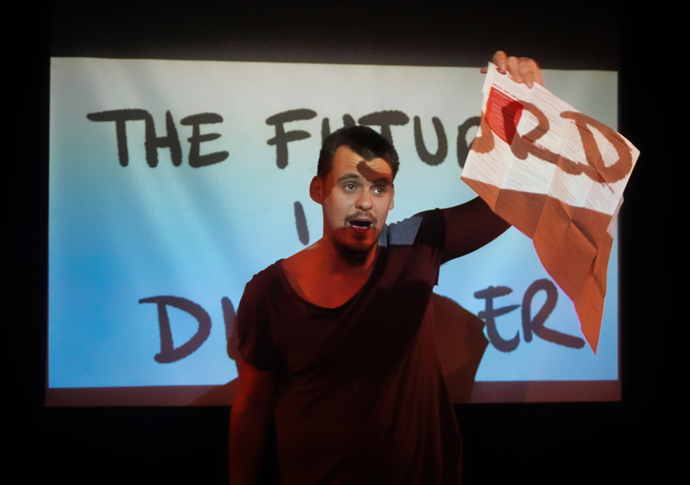The grubby truth
Sam Rees’s one-man play at Camden People’s Theatre shines a light on the casual acceptance of food banks. Dan Carrier reports
Thursday, 24th October 2024 — By Dan Carrier

Sam Rees in The Food Bank Show [The Food Bank Show]
THEY were considered one-off emergency parcels, and around 60,000 of them were delivered each week in 2010.
The bags of food were aimed at struggling households who needed something in the larder to tie them over till pay day.
Today, the figure is three million parcels, and food banks have become an accepted part of our social landscape.
The New Journal helped found the Castlehaven Food Bank in Camden Town during the pandemic: today it is busier than ever, helping around 400 households each week. Those 400 families are part of the eight million who instead of a weekly shop at a supermarket, head to a community centre, church or tenants’ hall to pick up kitchen cupboard must-haves. These eight million rely on charity, supermarket best-by cast-offs and the compassion of community workers.
This devastating fact has prompted writer and director Sam Rees to turn his attention to the scandal of hunger prevalent in Britain today.
Sam is part of theatre group The Carmen Collective and his latest project, The Food Bank Show, is on at the Camden People’s Theatre as part of their season The State We’re In.
The festival began in 2015, marking the general election of that year: it lifts the lid on Britain’s democracy, politics and public life, and returns as the new Labour government marks 100 days in office. The festival seeks to gauge the current state of political play, marking the theatre’s 30th anniversary and celebrating its radical roots in exploring social justice.
The project saw Sam spend a year talking to people who rely on food banks, collecting their stories, charting their experiences to create more than a snapshot as to what poverty in the 21st century in the UK looks like.
“It is a one-man show that follows my research in real time,” he says. “I wanted to have a sense of bringing the audience in. I look at food poverty, and I consider where the food banks are – how are the spaces used?
“We see repurposed churches, schools and other halls. We see food banks being run by charities, community groups. I wanted to explore what a food bank is, how it is used, how it has become normalised.”
To do so, Sam made contact with people who rely on food banks.
“I made a connection with someone, who remains anonymous, who uses a food bank,” he explains.
“I wanted to hear about what she has been through, the trials and tribulations, the issues over employment and benefits and record it in real time. That is the driving narrative. I was keen to merge a personal subject with the political.”
Drawing on research by the likes of the Rowntree Foundation and the Tressell Trust, Sam was able to create a wider picture to put the personal narratives into context.
“I looked at academics’ work in food poverty and spoke to poverty campaigners,” he says.
This included interviewing Labour MP Ian Burn in Liverpool. His constituency sees one in three rely on a food bank.
“It is a figure that is hard to quantify,” he says. “It makes no sense and it is absolutely vital we speak about.”
It could not be more pressing – 11.3m people have had food insecurity in the past 12 months, and Sam says the awful truth means speaking out to stop it becoming so normal the outrage diminishes.
“It is completely shocking,” he says. “I have looked for ways to convey what the numbers mean. Three million people rely on food banks. If you put all of those people in London, it would be a figure of one in three. I want to come up with things that are tangible to really illustrate what it means.”
Sam points out that food banks have become normalised – and even celebrated as a sign of communities looking out for each other.
“Fifty per cent of people say they are a national embarrassment,” he says. “But that means 50 per cent do not think that way. “And what is really shocking – more than anything else – is the clear lack of political will to do anything about this. Food banks are accepted. That isn’t right.”
• The Food Bank Show (Oct 31-Nov 2) is joined by plays about the economy: It’s the Economy, Stupid (Oct 25-26); the way we care for others in The Daisy Chain (Nov 6-8), political empowerment and representation in Andy Smith’s A Citizens’ Assembly (Nov 5) and the climate crisis in Shybairn’s This Is What Utopia Looks Like (Nov 9-10). See https://cptheatre.co.uk
• The Carmen Collective are collecting donations for the Euston Food Bank from October 21 until November 2. There will be a donation box in the foyer of CPT.